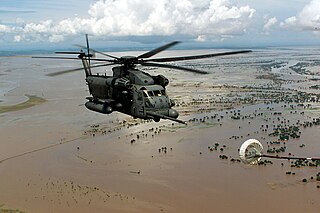
The World Food Programme (WFP) is the food-assistance branch of the United Nations and the world's largest humanitarian organization addressing hunger and promoting food security. According to the WFP, it provides food assistance to an average of 91.4 million people in 83 countries each year. From its headquarters in Rome and from more than 80 country offices around the world, the WFP works to help people who cannot produce or obtain enough food for themselves and their families. It is a member of the United Nations Development Group and part of its executive committee.
Welfare is a type of government support for the citizens of that society. Welfare may be provided to people of any income level, as with social security, but it is usually intended to ensure that the poor can meet their basic human needs such as food and shelter. Welfare attempts to provide poor people with a minimal level of well-being, usually either a free- or a subsidized-supply of certain goods and social services, such as healthcare, education, and vocational training.

Humanitarian aid is material and logistic assistance to people who need help. It is usually short-term help until the long-term help by government and other institutions replaces it. Among the people in need are the homeless, refugees, and victims of natural disasters, wars and famines. Humanitarian aid is material or logistical assistance provided for humanitarian purposes, typically in response to humanitarian crises including natural disasters and man-made disaster. The primary objective of humanitarian aid is to save lives, alleviate suffering, and maintain human dignity. It may therefore be distinguished from development aid, which seeks to address the underlying socioeconomic factors which may have led to a crisis or emergency. There is a debate on linking humanitarian aid and development efforts, which was reinforced by the World Humanitarian Summit in 2016. However, the approach is viewed critically by practitioners.
Legal aid is the provision of assistance to people otherwise unable to afford legal representation and access to the court system. Legal aid is regarded as central in providing access to justice by ensuring equality before the law, the right to counsel and the right to a fair trial. This article describes the development of legal aid and its principles, primarily as known in Europe, the Commonwealth of Nations and the United States.

The 2000 Mozambique flood was a natural disaster that occurred in February and March 2000. The catastrophic flooding was caused by heavy rainfall that lasted for five weeks and made many homeless. Approximately 700 people were killed. 1,400 km² of arable land was affected and 20,000 herds of cattle were lost. It was the worst flood in Mozambique in 50 years.

The Directorate-General for European Civil Protection and Humanitarian Aid Operations (ECHO), formerly known as the European Community Humanitarian Aid Office, is the European Commission's department for overseas humanitarian aid and for civil protection. It aims to save and preserve life, prevent and alleviate human suffering and safeguard the integrity and dignity of populations affected by natural disasters and man-made crises.
Official development assistance (ODA) is a term coined by the Development Assistance Committee (DAC) of the Organisation for Economic Co-operation and Development (OECD) to measure aid. The DAC first used the term in 1969. It is widely used as an indicator of international aid flow. It includes some loans.

Development aid or development cooperation is financial aid given by governments and other agencies to support the economic, environmental, social, and political development of developing countries. It is distinguished from humanitarian aid by focusing on alleviating poverty in the long term, rather than a short term response.
Emergency is a humanitarian NGO that provides free medical treatment to the victims of war, poverty and landmines. It was founded in 1994. Gino Strada, one of the organisation's co-founders, serves as EMERGENCY's Executive Director.

Before the creation of this entity under the title 'Australian Aid,' the Australian government's agency for the delivery of foreign aid was the separate entity known as AusAID, which indeed had formally been the Australian Agency for International Development, where AusAID was until 2013 the Australian organisation responsible for delivering most non-military foreign aid. It was an autonomous Commonwealth agency within the portfolio of the Minister for Foreign Affairs, and was an independent agency under the Financial Management and Accountability Act, yet part of the Department of Foreign Affairs and Trade for the purposes of the Public Service Act which covers human resources and non-financial accountability. It was based in the national capital, Canberra, and had representation in 25 Australian diplomatic missions overseas. However, on the 1st of November 2013, AusAID ceased to exist, with its substantial body of work re-evaluated and integrated into 'DFAT' ; -Since that time DFAT maintains responsibility for the Australian Aid programme, which is the streamlined version of the former agency.

The World Bank’s assistance program of foreign aid to Vietnam has three objectives: to support Vietnam’s transition to a market economy, to enhance equitable and sustainable development, and to promote good governance. From 1993 through 2004, Vietnam received pledges of US$29 billion of Official Development Assistance (ODA), of which about US$14 billion, or 49 percent, has been disbursed. In 2004 international donors pledged ODA of US$2.25 billion, of which US$1.65 billion was disbursed. Three donors accounted for 80 percent of disbursements in 2004: Japan, the World Bank, and the Asian Development Bank. During the period 2006–10, Vietnam hopes to receive US$14 billion–US$15 billion of ODA.

The Foreign Assistance Act is a United States Act of Congress. The Act reorganized the structure of existing U.S. foreign assistance programs, distinguishing between military from non-military aid, and created a new agency, the United States Agency for International Development (USAID) to administer non-military, economic assistance programs. President John F. Kennedy signed the Act on November 3, 1961, and issued Executive Order 10973, detailing the reorganization.
The Marka refugee camp is one of six emergency camps erected in 1968 to shelter 15,000 Palestinian refugees and displaced persons who left the West Bank and the Gaza Strip as a result of the 1967 Arab-Israeli war. Located in the Marka district of metropolitan Amman, about ten kilometers northeast of the city center, it is known locally as Hittin (حطين) or Schneller and houses 44,879 UNRWA registered refugees and over 17,500 displaced persons.

Extremely Severe Cyclonic Storm Nargis caused the worst natural disaster in the recorded history of Myanmar during early May 2008. The cyclone made landfall in Myanmar on Friday, 2 May 2008, sending a storm surge 40 kilometres up the densely populated Irrawaddy delta, causing catastrophic destruction and at least 138,373 fatalities. The Labutta Township alone was reported to have 80,000 dead, with about 10,000 more deaths in Bogale. There were around 55,000 people missing and many other deaths were found in other towns and areas, although the Myanmar government's official death toll may have been under-reported, and there have been allegations that government officials stopped updating the death toll after 138,000 to minimize political fallout. The feared 'second wave' of fatalities from disease and lack of relief efforts never materialized. Damage was estimated at over K62,988,000,000 (US$10 billion), which made it the most damaging cyclone ever recorded in this basin.
Mariano Ciai was an Italian wrestler. He competed in the featherweight event at the 1912 Summer Olympics.
The Migrant Offshore Aid Station (MOAS) is an international humanitarian organisation based in Malta dedicated to providing aid and emergency medical relief to refugees and migrants around the world.

Philippe Ciais is a researcher of the Laboratoire des Sciences du Climat et de l'Environnement (LSCE), the climate change research unit of the Institut Pierre Simon Laplace (IPSL). He is a physicist working on the global carbon cycle of planet Earth, climate change, ecology and geosciences.













